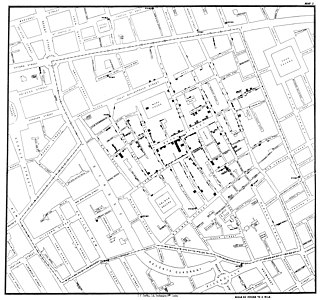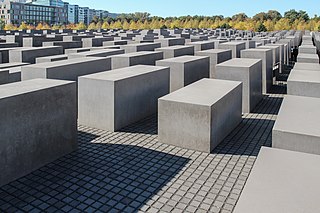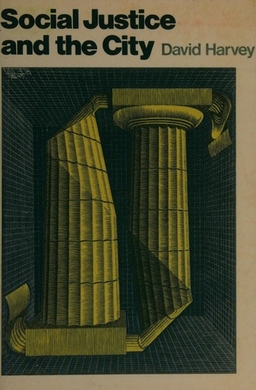
Human geography or anthropogeography is the branch of geography which studies spatial relationships between human communities, cultures, economies, and their interactions with the environment, examples of which include urban sprawl and urban redevelopment. It analyzes spatial interdependencies between social interactions and the environment through qualitative and quantitative methods.This multidisciplinary approach draws from sociology, anthropology, economics, and environmental science, contributing to a comprehensive understanding of the intricate connections that shape lived spaces.

Fredric Jameson is an American literary critic, philosopher and Marxist political theorist. He is best known for his analysis of contemporary cultural trends, particularly his analysis of postmodernity and capitalism. Jameson's best-known books include Postmodernism, or, The Cultural Logic of Late Capitalism (1991) and The Political Unconscious (1981).

David W. Harvey is a British Marxist economic geographer, podcaster, and Distinguished Professor of anthropology and geography at the Graduate Center of the City University of New York (CUNY). He received his PhD in geography from the University of Cambridge in 1961. Harvey has authored many books and essays that have been prominent in the development of modern geography as a discipline. He is a proponent of the idea of the right to the city.
Freudo-Marxism is a loose designation for philosophical perspectives informed by both the Marxist philosophy of Karl Marx and the psychoanalytic theory of Sigmund Freud. Its history within continental philosophy began in the 1920s and 1930s and running since through critical theory, Lacanian psychoanalysis, and post-structuralism.
Critical geography is theoretically informed geographical scholarship that promotes social justice, liberation, and leftist politics. Critical geography is also used as an umbrella term for Marxist, feminist, postmodern, poststructural, queer, left-wing, and activist geography.
Regional economics is a sub-discipline of economics and is often regarded as one of the fields of the social sciences. It addresses the economic aspect of the regional problems that are spatially analyzable so that theoretical or policy implications can be the derived with respect to regions whose geographical scope ranges from local to global areas.

Edward William Soja was an urbanist, a postmodern political geographer and urban theorist. He worked on socio-spatial dialectic and spatial justice.
Criticism of Marxism has come from various political ideologies, campaigns and academic disciplines. This includes general intellectual criticism about dogmatism, a lack of internal consistency, criticism related to materialism, arguments that Marxism is a type of historical determinism or that it necessitates a suppression of individual rights, issues with the implementation of communism and economic issues such as the distortion or absence of price signals and reduced incentives. In addition, empirical and epistemological problems are frequently identified.
Neil Robert Smith was a Scottish geographer and Marxist academic. He was Distinguished Professor of Anthropology and Geography at the Graduate Center of the City University of New York, and winner of numerous awards, including the Globe Book Award of the Association of American Geographers.
Marxist geography is a strand of critical geography that uses the theories and philosophy of Marxism to examine the spatial relations of human geography. In Marxist geography, the relations that geography has traditionally analyzed — natural environment and spatial relations — are reviewed as outcomes of the mode of material production. To fully understand geographical relations, on this view, the social structure must also be examined. Marxist geography attempts to change the basic structure of society.

The sociology of space is a sub-discipline of sociology that mostly borrows from theories developed within the discipline of geography, including the sub fields of human geography, economic geography, and feminist geography. The "sociology" of space examines the social and material constitution of spaces. It is concerned with understanding the social practices, institutional forces, and material complexity of how humans and spaces interact. The sociology of space is an inter-disciplinary area of study, drawing on various theoretical traditions including Marxism, postcolonialism, and Science and Technology Studies, and overlaps and encompasses theorists with various academic disciplines such as geography and architecture. Edward T. Hall developed the study of Proxemics which concentrates on the empirical analysis of space in psychology.
Uneven and combined development, unequal and combined development, or uneven development is a concept in Marxian political economy intended to describe dynamics of human history involving the interaction of capitalist laws of motion and starting world market conditions whose national units are highly heterogeneous. The concept is used by Marxist scholars concerned with economic development. David Harvey is an advocate of the usefulness of this theory to reconstruct historical materialism on Modern terms. It is an accepted key concept in academic economic geography.
Non-simultaneity or nonsynchronism is a concept in the writings of Ernst Bloch which denotes the time lag, or uneven temporal development, produced in the social sphere by the processes of capitalist modernization and/or the incomplete nature of those processes. The term, especially in the phrase "the simultaneity of the non-simultaneous", has been used subsequently in predominantly Marxist theories of modernity, world-systems, postmodernity and globalization.
J. Richard Peet is a retired professor of human geography at the Graduate School of Geography at Clark University in Worcester MA, USA. Peet received a BSc (Economics) from the London School of Economics, an M.A. from the University of British Columbia, and moved to the USA in the mid-1960s to complete a PhD in Geography from the University of California, Berkeley. He began teaching at Clark University shortly after completing his PhD from Berkeley, remained there for over 50 years, with secondments in Australia, Sweden and New Zealand.
Post-Marxism is a perspective in critical social theory which radically reinterprets Marxism, countering its association with economism, historical determinism, anti-humanism, and class reductionism, whilst remaining committed to the construction of socialism. Most notably, Post-Marxists are anti-essentialist, rejecting the primacy of class struggle, and instead focus on building radical democracy. Post-Marxism can be considered a synthesis of post-structuralist frameworks and neo-Marxist analysis, in response to the decline of the New Left after the protests of 1968.
Dialectical materialism is a materialist theory based upon the writings of Karl Marx and Friedrich Engels that has found widespread applications in a variety of philosophical disciplines ranging from philosophy of history to philosophy of science. As a materialist philosophy, Marxist dialectics emphasizes the importance of real-world conditions and the presence of functional contradictions within and among social relations, which derive from, but are not limited to, the contradictions that occur in social class, labour economics, and socioeconomic interactions. Within Marxism, a contradiction is a relationship in which two forces oppose each other, leading to mutual development.
Scientific socialism is a term which was coined in 1840 by Pierre-Joseph Proudhon in his book What is Property? to mean a society ruled by a scientific government, i.e., one whose sovereignty rests upon reason, rather than sheer will:
Thus, in a given society, the authority of man over man is inversely proportional to the stage of intellectual development which that society has reached; and the probable duration of that authority can be calculated from the more or less general desire for a true government, — that is, for a scientific government. And just as the right of force and the right of artifice retreat before the steady advance of justice, and must finally be extinguished in equality, so the sovereignty of the will yields to the sovereignty of the reason, and must at last be lost in scientific socialism.

History and Class Consciousness: Studies in Marxist Dialectics is a 1923 book by the Hungarian philosopher György Lukács, in which the author re-emphasizes the philosopher Georg Wilhelm Friedrich Hegel's influence on the philosopher Karl Marx, analyzes the concept of "class consciousness," and attempts a philosophical justification of Bolshevism.

Social Justice and the City is a book published in 1973 written by the Marxist geographer David Harvey. The book is an attempt to lay out afresh the paradigm of urban geography, by bringing together the two conflicting theses of methodology and philosophy. Going against the grain of his previous book Explanation in Geography published in 1970, he argued that geography cannot remain disengaged, impartial and ‘objective’ at a time when urban poverty and associated ills were reigning high.
David Howard Kaplan is an American geographer, academic, and author. He is a professor of geography at Kent State University.







